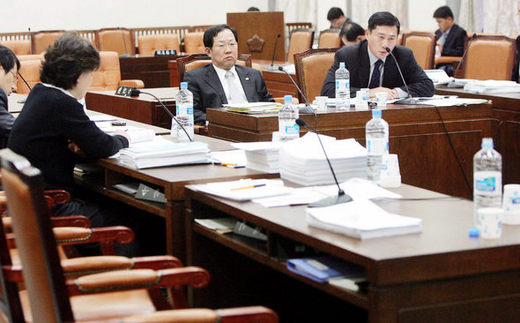 |
|
Bahk Byong-won (left), vice finance minister, is called before a National Assembly hearing.
|
Plan is part of drive to boost economy
The South Korean government confirmed that it will take measures to discard the equity investment ceiling, a restriction designed to prevent indiscriminate cross-investment between large conglomerates and their affiliate companies. "The government’s stance is that we will lift the ceiling on corporate investment," Vice Finance Minister Bahk Byong-won said in a radio interview July 7, citing demands from the ruling Uri Party to clarify their take on the issue. He did not elaborate on a timeframe for the change. The ceiling has been in place since the 1990s to prevent the country’s conglomerates from cross-investing in their own affiliate companies, thus creating unfair market competition. Under current regulations, companies with more than 6 trillion won (6 billion USD) in assets are subject to the cap. In a separate radio program later in the day, however, Minister Bahk showed a slightly more reserved stance, saying that discussions are required to look into several options on the issue.As for the push by some lawmakers for a bill to levy transfer taxes on properties based on the declared price rather than their market price, Bahk was opposed, saying that there is no plan to lower taxes. The market price of properties in South Korea is usually higher than the property’s declared price; levying taxes based on a lower amount, some say, would stimulate the economy by freeing up capital and spurring property investment. When asked to describe the nation’s economic policy in the second half, Bahk said that the government would undertake a more proactive push to complete state-led construction projects in the next six months, while at the same time trying to boost investment from the private sector.





